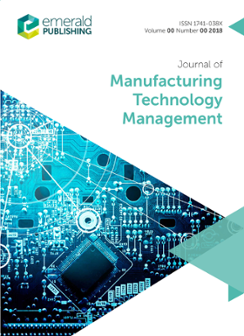Developing capabilities underlying to Industry 4.0 design principles within the manufacturing context
IF 7.3
2区 工程技术
Q1 ENGINEERING, INDUSTRIAL
引用次数: 0
Abstract
Purpose Using a dynamic capabilities approach, the present study aims to identify and assess the effects of organizational determinants on capabilities underlying Industry 4.0 design principles, such as integration, virtualization, real-time, automation and servitization. Design/methodology/approach PLS-SEM enables a two-stage hierarchical latent variable reflective-formative model which was used for assessing the effect of organizational determinants on Industry 4.0 design principles. Five hundred six manufacturing companies constitute the effective sample, representing a population of manufacturing companies in an industrialized country. Findings The findings reveal that Industry 4.0 design principles extensively depend on digitalization resource availability. At the same time, companies that possess digitalization and change management capabilities tend to devote more resources to digitalization. Finally, the paper reveals that networking and partnership capability is the critical enabler for change management and digitalization capabilities. Practical implications The paper provides empirical evidence that the successful development of Industry 4.0 design principles and their underlying integration, virtualization, real-time, automation and servitization capabilities are resource dependent, requiring significant upfront investment and continuous resource allocation. Further, the study implies that companies with networking and partnership, change management and digitalization capabilities tend to allocate more resources for Industry 4.0 transformation. Originality/value Exclusively focusing on empirical research that reported applied insights into determinants of Industry 4.0 design principles, the study offers unique implications for promoting Industry 4.0 digital transformation among manufacturing companies.在制造环境中开发基于工业4.0设计原则的能力
本研究采用动态能力方法,旨在识别和评估组织决定因素对工业4.0设计原则(如集成、虚拟化、实时、自动化和服务化)基础能力的影响。PLS-SEM实现了一个两阶段的分层潜变量反射形成模型,用于评估组织决定因素对工业4.0设计原则的影响。56家制造企业构成有效样本,代表一个工业化国家中制造企业的数量。研究结果表明,工业4.0设计原则广泛依赖于数字化资源的可用性。同时,拥有数字化和变革管理能力的公司倾向于将更多的资源投入到数字化中。最后,本文揭示了网络化和伙伴关系能力是变革管理和数字化能力的关键推动者。本文提供的经验证据表明,工业4.0设计原则的成功开发及其潜在的集成、虚拟化、实时、自动化和服务化能力依赖于资源,需要大量的前期投资和持续的资源配置。此外,该研究还表明,拥有网络和合作伙伴关系、变革管理和数字化能力的公司倾向于为工业4.0转型分配更多资源。该研究专注于实证研究,报告了对工业4.0设计原则决定因素的应用见解,为促进制造业企业的工业4.0数字化转型提供了独特的启示。
本文章由计算机程序翻译,如有差异,请以英文原文为准。
求助全文
约1分钟内获得全文
求助全文
来源期刊

Journal of Manufacturing Technology Management
Engineering-Control and Systems Engineering
CiteScore
16.30
自引率
7.90%
发文量
45
期刊介绍:
The Journal of Manufacturing Technology Management (JMTM) aspires to be the premier destination for impactful manufacturing-related research. JMTM provides comprehensive international coverage of topics pertaining to the management of manufacturing technology, focusing on bridging theoretical advancements with practical applications to enhance manufacturing practices.
JMTM seeks articles grounded in empirical evidence, such as surveys, case studies, and action research, to ensure relevance and applicability. All submissions should include a thorough literature review to contextualize the study within the field and clearly demonstrate how the research contributes significantly and originally by comparing and contrasting its findings with existing knowledge. Articles should directly address management of manufacturing technology and offer insights with broad applicability.
 求助内容:
求助内容: 应助结果提醒方式:
应助结果提醒方式:


